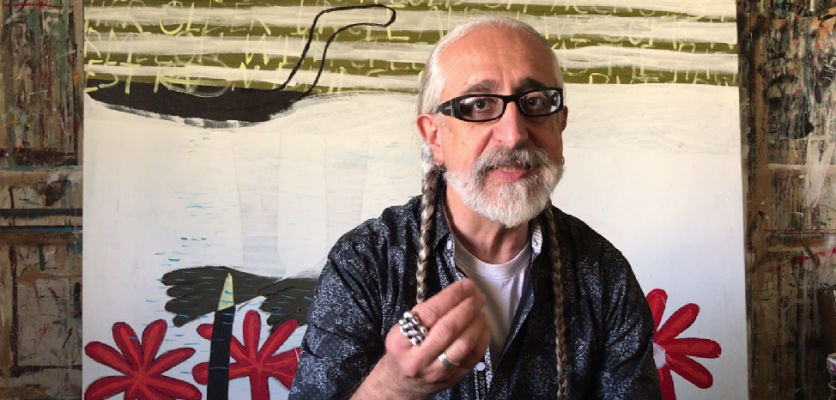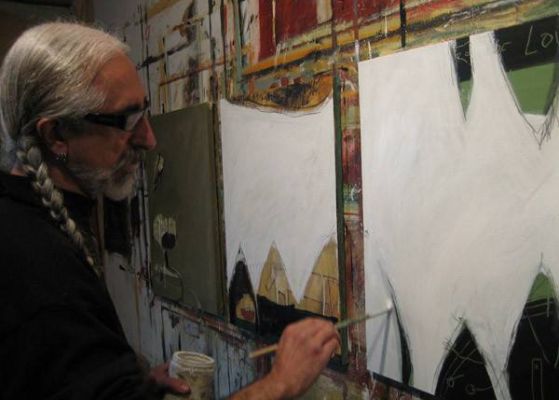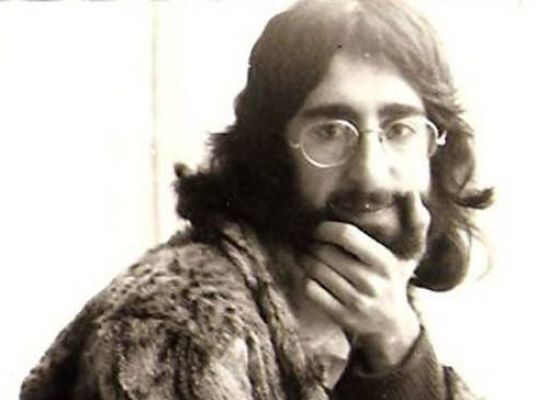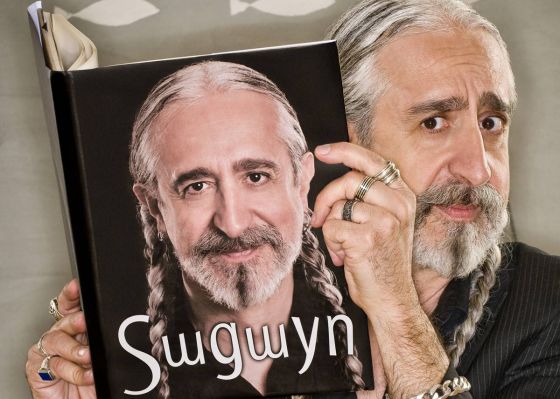Vahé Berberian: 'You need to have some kind of a mirror'
May 15, 2018
He is a seasoned stand-up comedian who makes awkward confessions and tells hilarious real-life anecdotes in a daring effort to break taboos. He is best known for his use of local words and flavors of the Armenian language to help us laugh at ourselves, yet he's a versatile artist who paints and writes with equal passion. Even at his most serious moment, when reflecting on everything from the creative process to why it matters to be Armenian, Vahé Berberian never fails to strike an ironic chord. We meet him twice in his birthplace Beirut, between his shows and lectures, in an attempt to connect with the wizard of art and humor behind the celebrity.
Vahé is on a rollercoaster tour once again. His next stops are in Canada, Argentina, the Eastern U.S., Venice, and Paris. His sold-out performances of "Ooremn" ("Therefore") are the talk of the town. Extra seats and shows have been added, as folks from all walks of life have flocked for a good laugh, eight days on end. Some have laughed uncontrollably, while others have tried to hold back their laughter (for reasons he cannot fathom). Public opinion is divided over the nature of his performances; some call it “offensive,” others call it “sensational."
We meet at a busy café. The moment he walks in, his tall stature with his distinctive braids and beanie evokes instant recognition. Fans greet him and ask for a selfie. It warms the heart to see his easy-going bonhomie, for the man on stage, who speaks directly to the audience and doesn’t hide his pleasure when he makes them laugh, is equally generous in real life.
But there is more to it. There is chemistry involved. “Upon seeing a fellow Armenian, I could give my heart away” kind of affection, which Khachatur Abovian , the Father of modern Armenian literature felt towards his fellow countrymen.
“Call me Vahé,” he insists, before the interview. What follows is a defying ebb and flow of thoughts.
.jpg) On cutting-edge art:
On cutting-edge art:"Anything that makes you uncomfortable, anything that involves experimentation, anything that’s fearless and tests the limits, but done with intent, and not with the sheer need to shock, because shock value disappears very fast. I see a lot of merit in shocking, but it doesn’t last long if it doesn’t have intellectual merit."
Intellectual vibe
The order is an odd mixture of halloumi sandwich and summer salad, hot chocolate and Scotch on the rocks, an apple pie capped with vanilla ice cream, salty peanuts, chips and carrot sticks, fresh juice and cappuccino… a sharp reminder of his on-stage argument about international foods “invading” our stomach, threatening our physical and mental well-being.
Yet the conversation is about anything but food, albeit equally international, peppered with quotes from Umberto Eco and Andre Breton: “We’re suffering from amnesia,” he says, conjuring the hero of The Mysterious Flame of Queen Loana as he struggles to explain why Armenians need to recreate their rich cultural heritage. “It is no longer possible to scandalize anybody,” he reflects, channeling the French surrealist’s angst into the contemporary art scene. He adds: “Do not be afraid to be sensational.” There is no hint of joking in his eyes, when he mentions Piero Manzoni, who made a statement about art by producing 90 cans of "Artist’s Shit," each numbered and labeled and sold for tens of thousands of dollars.
“Keep on the cutting edge," he urges, challenging the well-trodden roads, dissecting the worn-out discussions on how to bridge the gap between generations.
One way to reduce barriers is to question the deeply rooted assumption that art should emphasize nationalistic themes, he argues. “Everyone is making a movie about their grandparents surviving the [Armenian] Genocide,” he says. “In a recent movie contest, 70 percent of the entries tackled genocide-related topics. It’s an easy way to gain credibility; it’s easy to find relevant themes. It’s hard to dismiss a film tackling the issue. We have to overcome the genocide. I am not saying that we must forget it, but if we keep dwelling on the issue, it means the genocide is going on. We must move on.”
His subtle argument is mind-blowing. “If a piece of writing is difficult to understand, we call it serious stuff. That’s nonsense. Everyone suffers from ADD [Attention Deficit Disorder]. Write in a funny way; make the experience of reading fun for the reader. Being cool doesn’t mean being mediocre,” he beams, flashing his trademark smile. “It’s much more difficult to make something sound cool, really cool. It does take more work.”
No wonder “chutzpah” is his favorite word!
I ask for an interview—an official one. We meet on a rainy morning, in a sleepy suburb of Beirut. He hands me his mobile phone and asks me to shoot a promotional video (no joke) for his next stop in Vancouver. Then we pick up from where we had left off...
With comedy, there is the responsibility of crossing the line. You must be gutsy enough to offend people, because if you don’t—if you stop making fun—there is no comedy.
Vahé Berberian
.jpg) On why being Armenian matters:
On why being Armenian matters:“Because in the final analysis your culture is your identity. Why does it matter to be Vahé? Is it a legitimate question to ask? But the moment I say I am not Vahé, I become an absurdity. The question by default might lead you to a fallacy because your identity is what you are.”
Loucig Guloyan-Srabian: You have been among Armenians in every corner of the world and have encountered many facets of Armenian culture. How do you react to or process these diverse experiences?
Vahé Berberian: For me, the more I familiarize myself with the Armenian communities all around the world, the more it becomes evident that the differences are very superficial. Wherever we are, our major characteristic traits as Armenians remain the same, and I think this is the reason why my monologues are received so well everywhere, including Armenia. This is not a reflection of how good my material is, but rather how well we relate to each other all over the world.
L.G.S.: What does it mean to “be Armenian” to you? Can it be something that is "cool?"
V.B.: Being Armenian is a fun thing, a sexy thing. We have a very rich history and have created an incredible culture. We have this sense of closeness I haven’t found anywhere else. In my hippie days, when I was traveling within communes, I would meet a Dutch guy and I would say: “We have two Dutch in our group, you should meet them,” and the reaction was always, “What’s the big deal?” But if you found one Armenian—Hai es? Verjatsav! (հայ ես՝ վերջացա՜ւ—“You’re Armenian? It’s over!”), you have found a family! That sense of belonging is incredibly fascinating. I don’t think there are many nationalities that identify with that.
Also, as an Armenian I have always felt that embracing my Armenianness has enriched my life; it has given me a perspective that others don’t have. Without your Armenian side you’re flat— you’re like everybody else. Once you embrace your Armenianness, there is an added value to what you’re doing.
L.G.S: So then what is not cool or sexy about being Armenian?
V.B.: Unfortunately, we have created this misconception that being Armenian suggests being passé, being uncool, being outdated, outmoded, sticking to your values—whatever those values are. I hope it’s changing.
L.G.S.:In your last show, you mentioned that Armenians hardly smile. One of your lectures was entitled “Learning How to Laugh Again”. You have diagnosed a problem. Where do we go from here?
V.B.: We need to get out of this victim mode. Hundred years is too long to go through this phase of mourning. I believe that people can die of sadness. It could be that we are going through clinical depression or post traumatic disorder. This cannot go on for the rest of our lives, because the essence of progress is the here and now.
The self-deprecating humor is the fiber of your diet. Without humor, you’ll be constipated—and it will show! Anything that undergoes the test of humor and survives means it is strong enough. Anything that crumbles under humor means it wasn’t good enough anyway…
L.G.S.: We need a dose of self-mockery for a healthy nation. How can we overcome our insecurities?
V.B.: If you’re insecure, you’re done with. Any horrible characteristic change—being defensive, jealous, intolerant, arrogant—comes from insecurity. The only way that you might overcome your insecurity is by trying to come to a point where you do not have much to prove to anyone; where you are content with yourself and you don’t have to shout and scream to make your existence known. For this, you need a very honest introspection. If it’s personal, you look into the mirror and you say: “Man, I am aging, my hair is getting white, my nose is getting bigger, my breasts are sagging.” You need to recognize what it is you are seeing in the mirror. As a nation, you need to have some kind of a mirror to go into this phase of introspection. That mirror is likely your artists, your intellectuals, people who have the courage to be your mirror to say, “Listen, you’re gaining weight man, this is not cool!” And to be tolerant enough to say, “Thank you, point taken!” Because if you chastise and say, “Ah, this guy is anti-Armenian,” which happens all the time within our community, then you’re breaking your mirror.
L.G.S.: You also said that there was a time when people made fun of comedians and listened to politicians and that now the opposite is true. Does this put extra pressure on comedians, or do they just take things as they are?
V.B.: Years ago, we had people like Churchill, de Gaul, and Mitterrand: erudite people in power. Now look at where we are. Maybe comedy has changed too. It has become blowsier and sharper, because comedians have realized that there is more responsibility on their shoulders (hopefully). With comedy, there is the responsibility of crossing the line. You must be gutsy enough to offend people, because if you don’t, if you stop making fun, there is no comedy.
I will never ever part with anything or consider anything finished, until I don’t have a single iota of doubt about it.
L.G.S.: As a comedian how do you react to criticism?
.jpg) On how to avoid failure as an artist:
On how to avoid failure as an artist:“To be open enough to tolerate criticism and to surround yourself with people who you trust enough, to allow them to criticize you, to listen to them, but at the same time to have enough self-confidence to draw the line.”
V.B.: I’d be lying if I said it doesn’t affect me, especially when it comes from younger people who are mentally old. It doesn’t offend me, but the stupidity saddens me. There is a huge difference. I have gotten over the fact that people will be unfair, and I have also come to realize that people make comments, say things, not just to tell you something. It is mostly to tell themselves something, or to insinuate something. Like how someone recently told me that my monologue was sexist. She was saying only one thing: “I am a feminist.” So, I don’t take it personally.
L.G.S.: As an artist, how can you tell if what you’re creating is exactly what you want to create?
V.B.: When I had just begun my career as an artist, I needed the money and I sold pieces that I wasn’t sure of. I wish they would sell these pieces back to me—I would destroy them. But after becoming more comfortable economically, and because of the acknowledgment that I have received, I think I will never ever part with anything or consider anything finished until I have no single iota of doubt about it.
If you’re an artist, you know this. If you’re writing a page, one sentence, even a word, the colors, some shape, there is always something that might bother you. If I have that one iota of doubt, if need be, I will repaint the entire piece, or I will sit on that one sentence for three years to make sure that I am happy with it. I do not want any regret. Years later, you may outgrow, you may change, you may look at something and say: “Oh, what is this?” But to part with something with a 100 percent clear conscience, is different.
L.G.S.: Is parting with something with a clear conscience equally important in your performances?
V.B.: Absolutely—especially in my performances, because in the end, you must sleep well, you must be honest with yourself. I have always used this analogy: For me, life is like a cocktail party where you’re drinking and everything that happens to you is some kind of drink. The death of your father is a large glass of whiskey; you fall in love with the wrong person and it’s three shots; you keep consuming everything that happens to you. It’s intoxicating because they are life-altering events. The books that touch you, the music that you listen to, your political affiliations, everything goes in there. When you can’t take it anymore, you have to throw up. Art is the process of shoving your finger in your mouth and throwing up. It has to be honest. You can’t hide anything: your political affiliations, your loves, whatever that’s inside you. If you have not succeeded in the catharsis, in purging everything, then your art is mediocre. Yes, absolutely! We can use that word.
If you have not succeeded in the catharsis, in purging everything, then your art is mediocre.
L.G.S.: Do we have signs of cutting-edge art in Armenian life?
V.B.: I think we do. Don’t ask me who, where, and what, but in my travels, I always meet young, fearless, audacious artists who are trying. Some of them may not be succeeding, but all it takes is the attempt. I see a lot of value in trying. In our Armenian reality, when people say I am going to start something, the most cynical thing is to say: “Ah, others have done it.” That is very sad because in the end nothing lasts forever, but the attempt to do it is very important.
L.G.S.: Any piece of advice to aspiring performers, artists, and writers in the age of social media and the Internet?
V.B.: The Internet has made a lot of things easier, but it’s very important to use it wisely. It will consume your life if you do not put a limit to it. As an artist, you have to be very careful not to be reacting to things. I call this twice removed syndrome. It used to be that artists created through their own experiences. Now, the inspiration comes from things that have been created and they bounce back, while artists have completely cut themselves from their experiences and react to what has been created. The Internet has a lot to do with it. This is especially common in third world countries and in Armenia, where artists think that if someone in, let’s say New York is doing something, they too can do it, or outdo it, without realizing that their life in Vanadzor has nothing to do with the artist’s life in New York.
Visit Vahé Berberian's website, where you can find more information about his artwork, books, plays, and standups. Also, check out his blog "Blending Reality."
Video
Join our community and receive regular updates!
Join now!




Attention!